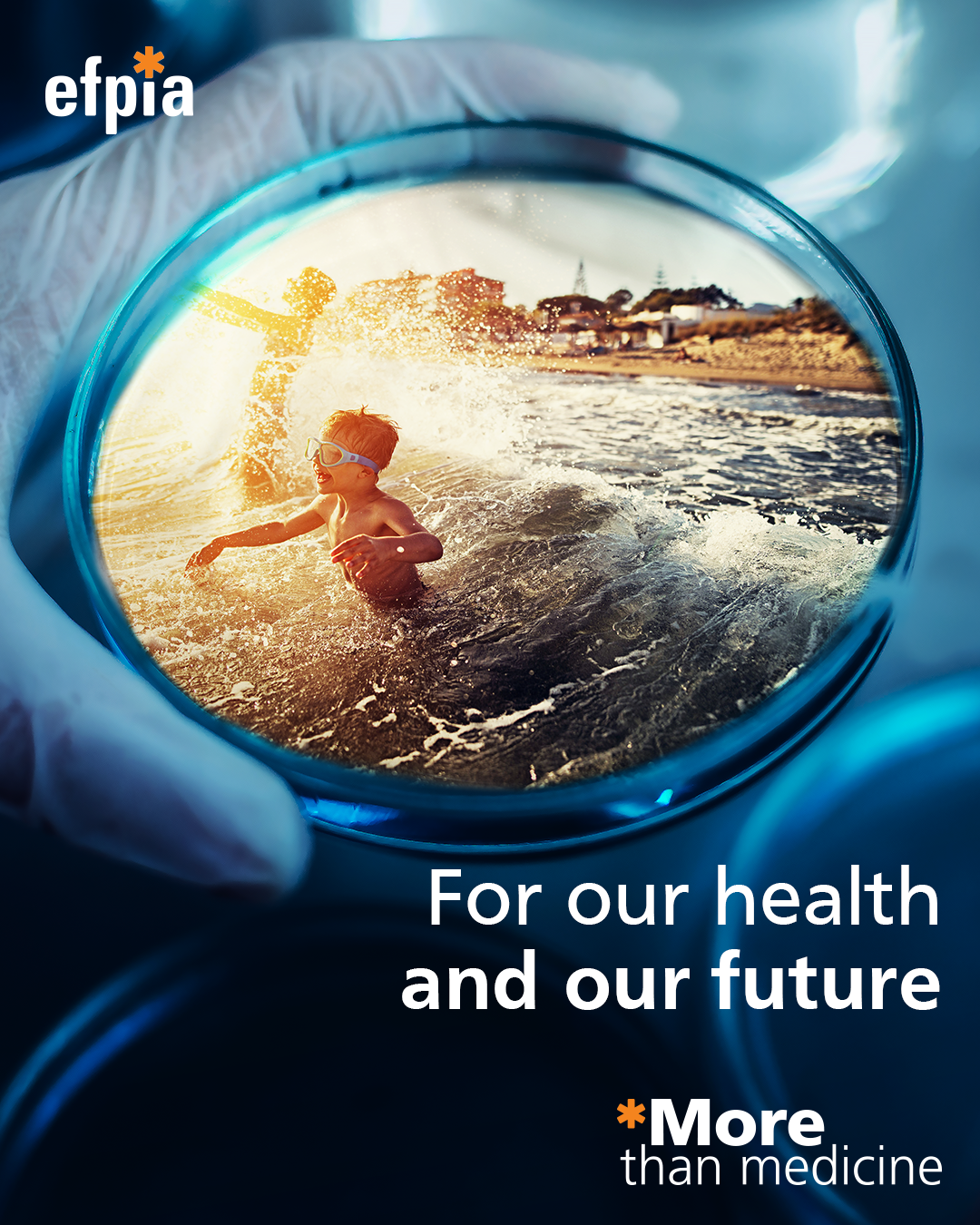Improving Health
#MoreThanMedicine
Improving Health

Changing patients’ lives
Medicines continue to transform the lives of patients across multiple disease areas. Take HIV, for example: antiretroviral medications have made HIV, a disease that was once invariably fatal, into a manageable chronic condition for many [14]. For people living with Hepatitis C, 95% can now be cured with a 12-week course of medicine – an achievement that would have been impossible without game-changing advances in medical science [15]. Take breast cancer where new treatments have resulted in a gain of nearly 1.2 million healthy life years between 2007 and 2017 [16]. What is impossible to quantify is the value of mums, daughters, grandmothers, friends having more time with the ones they love. That is #MoreThanMedicine.

Preventing illness
Vaccines and medicines are improving health not only by treating patients but by preventing illness in first place. It is more than avoiding clinical symptoms and reducing the need for medical care. Prevention provides opportunities to flourish, keeping children in school, ensuring adults can play an active role in their communities and contribute to the economy. It means avoiding the burden on individuals and families that are associated with stroke or the complications of diabetes. And it helps ensure a more sustainable future for health and care systems by avoiding or slowing the progression of chronic illness.
- Saving lives and preventing disability: Between 2001 and 2020, vaccines averted an estimated 20 million deaths, 500 million cases of illness, and 9 million cases of long-term disability globally [1] [2]
- Healthier children: Vaccinated children attend school more regularly than those who have not been vaccinated; they have better cognitive performance and obtain higher grades [3].
- Reduced hospitalisation: In Spain, hospitalisations due to chickenpox decreased by 78% after routine vaccination of 15–18-month-old infants between 2006 and 2010 [4].
- Less disease: In Italy, introduction of routine vaccination against hepatitis B virus (HBV) led to an 82% decline in the incidence of HBV from 1991 to 2010 [5].
- HIV: Thanks to successful therapies, the number of AIDS deaths worldwide has more than halved in the last 20 years [6].
- Pandemic response: Pharmaceutical companies have developed vaccines against COVID-19 to reduce the risk of people being hospitalised or dying. Two years after COVID-19 was declared to be a pandemic, more than 12 billion doses [7] had been administered globally, averting at least 20 million deaths [8] [9].
- Ending polio: Since 1988, polio cases have decreased by over 99% [10]. An estimated 18 million people can walk today who would have otherwise been paralysed, and 1.5 million childhood deaths have been averted through immunisation activities [11].
- Controlling complications: The discovery of insulin has saved millions of lives and prevented complications, including kidney disease, heart disease and problems with vision, oral health and feet [12].
- Healthier hearts: Statins, cholesterol-busting medications taken by millions of people in Europe, are proven to reduce the risk of heart attack and stroke, including for those who have already suffered a cardiac event [13].

Antimicrobial Resistance: a societal challenge
Antimicrobials have improved the lives of millions of people, making healthcare safer and more efficient. However, antimicrobial resistance (AMR) poses a real and urgent threat to individuals and health systems.
Developing the next generation of antibiotics is a priority for society. Industry is playing its part in rising to the challenge. The pharmaceutical industry, leading global philanthropies and development banks have formed the AMR Action Fund – dedicating around €1 billion to help respond to the AMR threat. The Fund aims to bring 2-4 new antibiotics to market this decade.
Working with Health Systems
The pharmaceutical industry delivers #MoreThanMedicine to health systems. Companies are at the forefront of advances in digital health, new ways to introduce technologies into health systems and novel partnerships that bring innovation to how care is delivered enabling patients to monitor their disease and take action when needed. They develop patient support tools like reminders for patients to take their medicine, simpler or automated measurements of markers of a patient’s disease that can be shared live with their doctor.
We will continue to share expertise and knowhow, taking a collaborative approach to co-create solutions to the common challenges we face as a society.
From the novel use of digital tools to identify familial hypercholesterolemia (FH) patients in Sweden to improving care and outcomes for respiratory patients in the UK, there are a series of case studies on industry-health system collaborative initiatives to advance patient care and improve outcomes for patients and the health systems.
Case studies
It is estimated that less than 5% of people in Sweden with familial hypercholesterolemia (FH) have been diagnosed with the condition. In response, Amgen formed a partnership with Health Solutions and the Karolinska University Hospital and together developed FHabian, a secure web-based platform for people diagnosed with FH to create a virtual family tree and invite relatives to screening.
Following a successful pilot, it is now in routine use at the Karolinska University Hospital where experts estimate it will allow them to find and diagnose half of all people with FH in the Stockholm region within three years. This corresponds to about 3,700 patients currently undiagnosed.2
Fhabian was shortlisted for the Svea prize in 2021, an award in Sweden which recognises innovative solutions for eHealth.
People with respiratory illnesses, such as asthma and COPD, sometimes need care from several specialists at primary care and hospital level. Connecting these services can be a challenge for patients navigating the health system. Boehringer Ingelheim developed a partnership aimed to improve care and outcomes for respiratory patients in Oxfordshire, UK. Working with local healthcare providers and bringing together their collective skills and expertise, they piloted a multidisciplinary integrated respiratory team that coordinated service provision around the needs of patients.
This partnership approach led to timely, coordinated care closer to home for respiratory patients in the area which showed potential to reduce system costs and resulted in improved patient experience and outcomes. The project won a Health Service Journal (HSJ) partnership award in 2021.
Connecting healthcare stakeholders to advance patient care is a priority for pharmaceutical companies. Building relationships between the academic, health professional, industry and patient communities can deliver breakthroughs that are not possible when one actor works alone. The Connecting Healthcare Awards celebrate multi-stakeholder collaboration sharing inspiring examples from dozens of projects across Europe[17].
The International Map of Axial Spondyloarthritis (IMAS) was a worthy winner of the overall prize in the Connecting Healthcare Awards. This initiative gathered real-world insights from over 4,000 participants, capturing patient experiences in a way rarely reflected in clinical studies. The findings triggered discussions with patients and rheumatologists worldwide to inform clinical decision-making, shorten diagnostic delay and ensure patients receive optimal care. In addition to publishing 48 scientific abstracts and congress presentations, the project was brought to life through an interactive artistic sculpture on display at a premier rheumatology congress.
Powering up Europe’s health systems
EFPIA takes a long-term view of advancing health and is stepping up to its responsibilities in meeting the challenges of our time: rising rates of chronic diseases, antimicrobial resistance and climate change. To support the renewed political and public prioritisation of health, we have set out five priorities for investing in European healthcare.
Our shared goal must be to POWER up our health system, focusing on:
POWERing up means embracing the transformational tools we need – namely digitalisation and innovation that generates value for patients, health systems and society as a whole. By proposing concrete and detailed solutions, we are demonstrating our willingness to work with others to improve our health systems. We are delivering #MoreThanMedicine.
Case studies
EFPIA strongly support digitalisation within our industry and the health sector as a whole. We recently caught up with one of our member companies, Amgen, who told us about two recent innovative digital initiatives designed to identify patients at risk of cardiovascular disease and optimise care pathways.
In partnership with established software providers, Amgen has developed a programme called CValuate which is integrated into electronic health record systems and provides HCPs with real-time cardiovascular evaluation reports including crucial information on risk factors and recommended targets. The aim is to identify high-risk patients, and provide solutions to unlock systemic barriers and ultimately deliver better patient outcomes. (...)
Read more.
EFPIA supports public-private partnerships and industry collaboration across professions to leverage every opportunity to tackle challenges in our health ecosystem.
We recently caught up with one of our member companies, Boehringer Ingelheim UKIE (BI), to learn about their approach to collaborative working with the UK National Health Service (NHS).
The aim at BI, is to partner with the healthcare community at national, regional and local levels with a goal to improve outcomes for patients and benefit the NHS. In fact, they have a specific team dedicated to identifying and delivering opportunities to work in partnership with the UK National Health Service (NHS) with the goal of co-creating a longterm sustainable healthcare solution. (...)
Read more.
EFPIA believe securing the future of health systems starts with financing them according to their true value to societies and economies. Smart spending on pharmaceuticals will be essential to help improve efficiency, but pharmaceuticals account for only one fifth of health expenditure.1 True efficiency gains will require organisational reform to integrate services and budgets in people-centred ways, and align them toward common goals of improving health outcomes. Only then can investments in one area generate long-term or system-wide value.
We recently caught up with one of our member companies, Takeda (Italy), who shared with us the work they have been doing to advocate and support an approach to process re-design known as Lean methodology within the healthcare sector in Italy. (...)
Read more.
EFPIA believes that future health systems should orientate all their resources toward delivering better outcomes – thereby maximising value. As the EFPIA POWER Up report emphasises, measured outcomes should be relevant to patients themselves and should be assessed across the full cycle of care, i.e. encompassing all healthcare services and providers involved in a patient’s care.
We caught up with one of our member companies, Roche (Denmark), to learn about a value-based healthcare partnership they have been working on with the Capital Region of Denmark and Herlev Gentofte University Hospital. (...)
Read more.
Response to emergencies
Europe has continued to count the devastating human and economic cost of the COVID-19 pandemic and, in solidarity with people across Europe, we have expressed our sorrow at the suffering caused by Russia’s invasion of Ukraine. The response from our industry was an unprecedented collaborative effort to find vaccines and treatments that could protect citizens against the coronavirus and in Ukraine, companies have come together to donate around 30 million doses of vital medicines, again delivering #MoreThanMedicine.

Supporting the response to COVID-19
As well as working to find vaccines, diagnostics and treatments for COVID-19, the industry in Europe provided financial support and in-kind donations to organisations on the ground and worked closely with health authorities to combat this global public health emergency.

EFPIA companies and associations are offering humanitarian support both in Ukraine and for the emerging refugee crisis in neighbouring EU Member States. This includes providing millions of doses of essential medicines and financial support to NGOs.
References
[1] •-2-VE-public-health-impact-infographic.pdf (vaccineseurope.eu)
[3] https://www.ncbi.nlm.nih.gov/pmc/articles/PMC7371956
[4] https://www.vaccineseurope.eu/news/articles/realising-the-full-value-of-vaccination
[5] Boccalini 2013 Economic analysis of the first 20 years of universal hepatitis B vaccination program in Italy Human Vaccines & Immunotherapies http://dx.doi.org/10.4161/hv.23827
[6] UNAIDS (2021), Factsheet World AIDS Day 2021.
[7] Coronavirus (COVID-19) Vaccinations - Our World in Data
[8] Global impact of the first year of COVID-19 vaccination: a mathematical modelling study - The Lancet Infectious Diseases
[9] https://ec.europa.eu/info/live-work-travel-eu/coronavirus-response/safe-covid-19-vaccines-europeans_en;
[11] Global Health - Newsroom - Polio (cdc.gov)
[12] What’s next in diabetes care - 100 years since the lifesaving discovery of insulin (Guest blog) (efpia.eu)
[13] Statins for the primary prevention of cardiovascular disease - PMC (nih.gov)
[14] https://www.thelancet.com/journals/lanhiv/article/PIIS2352-3018%2817%2830066-8/fulltext?elsca1=tlpr
[15] Hepatitis C Disease Burden in the United States in the era of oral direct‐acting antivirals - Chhatwal - 2016 - Hepatology - Wiley Online Library
[16] https://www.efpia.eu/media/412939/efpia-economic-societal-footprint-industry-final-report-250619.pdf
[17] Announcing the winners of the 2021 EFPIA Connecting Healthcare Awards